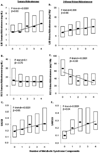Abnormal aldosterone physiology and cardiometabolic risk factors
- PMID: 23399714
- PMCID: PMC3615445
- DOI: 10.1161/HYPERTENSIONAHA.111.00662
Abnormal aldosterone physiology and cardiometabolic risk factors
Abstract
Abnormal aldosterone physiology has been implicated in the pathogenesis of cardiometabolic diseases. Single aldosterone measurements capture only a limited range of aldosterone physiology. New methods of characterizing aldosterone physiology may provide a more comprehensive understanding of its relationship with cardiometabolic disease. We evaluated whether novel indices of aldosterone responses to dietary sodium modulation, the sodium-modulated aldosterone suppression-stimulation index (SASSI for serum and SAUSSI for urine), could predict cardiometabolic risk factors. We performed cross-sectional analyses on 539 subjects studied on liberal and restricted sodium diets with serum and urinary aldosterone measurements. SASSI and SAUSSI were calculated as the ratio of aldosterone on liberal (maximally suppressed aldosterone) to the aldosterone on restricted (stimulated aldosterone) diets and associated with risk factors using adjusted regression models. Cardiometabolic risk factors associated with either impaired suppression of aldosterone on liberal diet, or impaired stimulation on restricted diet, or both; in all of these individual cases, these risk factors associated with higher SASSI or SAUSSI. In the context of abnormalities that constitute the metabolic syndrome, there was a strong positive association between the number of metabolic syndrome components (0-4) and both SASSI and SAUSSI (P<0.0001) that was independent of known aldosterone secretagogues (angiotensin II, corticotropin, potassium). SASSI and SAUSSI exhibited a high sensitivity in detecting normal individuals with zero metabolic syndrome components (86% for SASSI and 83% for SAUSSI). Assessing the physiological range of aldosterone responses may provide greater insights into adrenal pathophysiology. Dysregulated aldosterone physiology may contribute to, or result from, early cardiometabolic abnormalities.
Conflict of interest statement
Figures

References
-
- Briet M, Schiffrin EL. The role of aldosterone in the metabolic syndrome. Curr Hypertens Rep. 13:163–172. - PubMed
-
- Krug AW, Ehrhart-Bornstein M. Aldosterone and metabolic syndrome: Is increased aldosterone in metabolic syndrome patients an additional risk factor? Hypertension. 2008;51:1252–1258. - PubMed
-
- Tomaschitz A, Pilz S, Ritz E, Grammer T, Drechsler C, Boehm BO, März W. Association of plasma aldosterone with cardiovascular mortality in patients with low estimated gfr: The ludwigshafen risk and cardiovascular health (luric) study. Am J Kidney Dis. 2011;57:403–414. - PubMed
Publication types
MeSH terms
Substances
Grants and funding
- M01-RR02635/RR/NCRR NIH HHS/United States
- K23 HL111771-01/HL/NHLBI NIH HHS/United States
- UL1RR025758/RR/NCRR NIH HHS/United States
- F31 NR011108/NR/NINR NIH HHS/United States
- K24 HL103845/HL/NHLBI NIH HHS/United States
- R01 HL087060/HL/NHLBI NIH HHS/United States
- T32 HL007609/HL/NHLBI NIH HHS/United States
- U54 LM008748/LM/NLM NIH HHS/United States
- U54LM008748/LM/NLM NIH HHS/United States
- UL1 RR025758/RR/NCRR NIH HHS/United States
- F32 NR013318/NR/NINR NIH HHS/United States
- R01 HL104032/HL/NHLBI NIH HHS/United States
- L30 HL104553/HL/NHLBI NIH HHS/United States
- R01 HL047651/HL/NHLBI NIH HHS/United States
- HL59424/HL/NHLBI NIH HHS/United States
- P50 HL055000/HL/NHLBI NIH HHS/United States
- M01 RR002635/RR/NCRR NIH HHS/United States
- P50HL055000/HL/NHLBI NIH HHS/United States
- K23 HL111771/HL/NHLBI NIH HHS/United States
- R01 HL114765/HL/NHLBI NIH HHS/United States
LinkOut - more resources
Full Text Sources
Other Literature Sources
Medical

